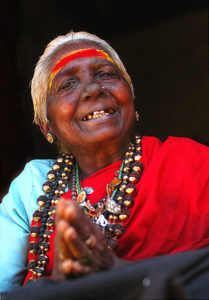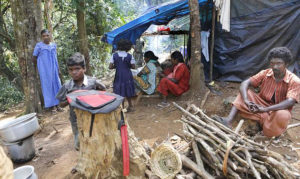In the middle of March, two major Indian newspapers published articles about the Malapandaram of Kerala. The New Indian Express published an analysis of the conditions in some colonies near Sabarimala on March 9 and the Times of India weighed in covering mostly the same people and colonies on March 12. This peaceful society is rarely covered by the press so the back to back overage was unusual.

The New Indian Express article opens with comments by Raju, the chief of the Manjathodu colony, which is located on the highway up to Sabarimala, the great Hindu pilgrimage site. Raju, 41, described for the journalist his daily survival strategies. The trumpeting of a wild elephant could be heard in the distance by the journalist, prompting Raju to comment that they have to listen at night for them. When the elephants attack their buildings, as they do frequently, the people have to run for their lives. All they can do is rebuild.
Almost two years ago, Raju and his family and 15 other Malapandaram families resettled at Manjathodu after they were assured by government officials that they would be given tracts of land. That still has not happened.
One official, the former Collector for the Pathanamthitta District, intervened and helped them obtain identity documents and ration cards. Apparently, in the past officials in the forest department of Kerala opposed transfering land to the tribal people. This time around, the Tribal Extension Officer is hoping to find a solution.

The article also described some social issues facing the Malapandaram, especially the over-consumption of alcohol. The tribal people earn money by gathering forest products which they then sell. Many use the funds to purchase alcohol and then return to their homes drunk. According to V.K. Narayanan, the chief of the Attathodu colony, “alcoholism is highly prevalent among both men and women. Fights are also common making it difficult to settle all at one place.”
The journalist visited Attathodu, about 20 km. east of Manjathodu, and found that a variety of tribal people lived in that much larger settlement, including some Malapandaram. The people in the larger settlement enjoyed an uninterrupted power supply and proper roofs on their buildings. They still must contend with interruptions of their water supply and raids from aggressive wild animals.
The Times of India opened its article, much as the NIE did, with comments by Raju from the Manjathodu colony. He said that his four children are all studying in tribal schools and living safely in hostels but he, his wife, and his 75-year-old mother are at the mercy of the wild animals. He added that he has to buy his drinking water.
The TOI quoted a woman named P.V. Manju from Attathodu. She expressed outrage at the attitudes of Indian women in demanding the right to join the hordes of men at the annual pilgrimage to Sabarimala, an issue that roiled India two years ago. The pilgrimage to the temple of the god Ayyappan is one of the biggest in the world, but until 2018 it had been restricted to men only. Ms. Manju felt that the presence of women on the pilgrimage was an affront to their Hindu faith.